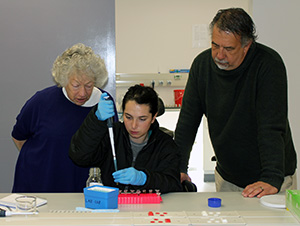Latest News Archive
Please select Category, Year, and then Month to display items
18 April 2018
Photo Facebook
 Gerda Steyn, former Kovsie student and winner of the Two Oceans ultramarathon this year, with her trophy.
Gerda Steyn, former Kovsie student and winner of the Two Oceans ultramarathon this year, with her trophy.
Gerda Steyn, female winner of this year’s Two Oceans ultramarathon, says her life has changed for the better in a very short time.
The former Kovsie received an invitation to a world-renowned marathon at the end of the year. She may not reveal the details yet.
Steyn, who studied Quantity Surveying and Construction Management at the University of the Free State (UFS) between 2009 and 2012, was just the third South African to win the Two Oceans since 1994. Her time of 3:39:31 was the second-best in the past seven years. For many she was a surprise winner because she didn’t compete last year and only managed a 14th place in 2016.
“Things really took off since the race (in Cape Town at the end of March). I received a lot of exposure. People say you must try and win the race, but they don’t tell you what will happen after that with all the media attention.
“My next goal is the Comrades for which I started training in the third week of April. I will only decide on my specific goals for the race two weeks beforehand.” She obtained a fourth place last year.
According to Steyn, who is a full-time athlete, she only did a couple of cross country races while she was studying.
“I played a bit of soccer and hockey for my hostel (Soetdoring). I have very fond memories from my university days. A couple of our hostel friends had a reunion after the race in Cape Town and had reason to have a big party.”
Monkey research attracts international attention
2016-07-11

Prof Trudy Turner from the University of
Wisconsin-Milwaukee and Prof Paul Grobler
from the Department of Genetics at the
University of the Free State, together with one
of the students researching monkey genes.
Photo: Siobhan Canavan
For this year’s Summer School programme, Prof Paul Grobler, from the University of the Free State Department of Genetics focuses on research about the conflict between monkeys and humans in areas where monkeys are regarded as problem animals.
Global expert part of research
This year, Prof Grobler is hosting a group of students and lecturers from the United States of America (USA). The group includes Prof Trudy Turner from the University of Wisconsin-Milwaukee (UWM), a global expert on vervet monkeys. She has been working with the Department of Genetics at the UFS for the past fifteen years, and has also been appointed as an Affiliated Professor in the department.
“The Summer School programme is an opportunity for the American Primatology students to gain practical experience in Africa,” says Prof Grobler.
International interest in Summer School
This year’s Summer School programme involves four lecturers and nine students. The lecturers are from the University of Wisconsin-Milwaukee (UWM), the University of California, Los Angeles (UCLA), Boston University, and Central Washington University.
“We use the genetic information to determine
how monkeys historically infiltrated the
different areas in South Africa.”
This year’s focus is on the genetic structure of the monkeys in South Africa, and research that is being done on the differences and similarities in monkeys from different areas. “We use the genetic information to determine how monkeys historically infiltrated the different areas in South Africa,” says Prof Grobler.
Local nature reserve acting as host
The group will perform field work, including observing monkeys in the Soetdoring Nature Reserve, as well as laboratory work in the department, where they will be assisted by two laboratory technicians.
Two years ago, Prof Grobler and his department tested this idea on a smaller scale, and now they hope to make this a regular event.